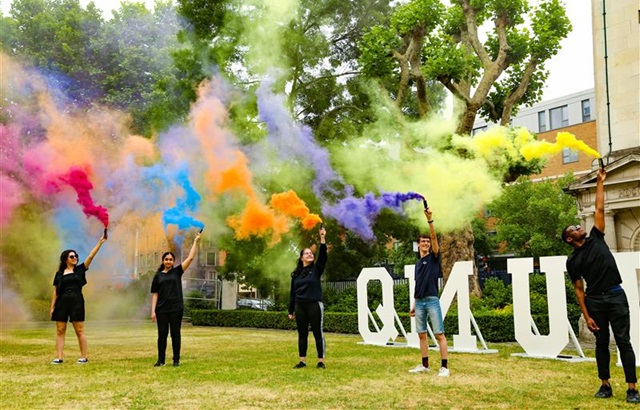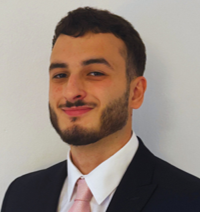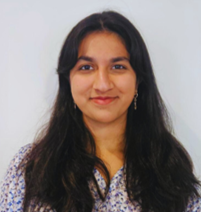Outstanding education breeds outstanding success
Queen Mary University of London, ranked 92nd in the world and 9th in the UK, has a 240-year history of providing outstanding education to students from its local communities and around the world. Integral to this education is how the University, ranked 24th in the world for its quality of research, embeds research practice and findings in its education offer. Thanks to this world-class, research-led education, students from Queen Mary go on to make real, positive changes to the world.

“The University provided the support, funding, and facilities I needed to explore both research and entrepreneurship as a dental student.”

Dr Florence Mai (BDS, iBSc (Hons)), graduated dentistry at Queen Mary in 2024.
Today, she is an Academic Foundation Dentist, an Honorary Research Fellow at Queen Mary, and the founder of nattüra.
“When I decided to study dentistry, I knew I wanted to attend Queen Mary. It has a brilliant reputation for providing dental students with a hands-on education and for carrying out innovative research.
“When I arrived on campus, I knew I’d made the right choice. I remember our lecturers talking about how the course would be delivered and two things stood out to me. One was that a lot of our learning would be visual – as someone with dyslexia, I appreciated this, and it put me at ease. The other was that our course would be ‘live’ – that is, new, emerging research findings would be integrated into our studies, so we could be confident we were up-to-speed with the latest in dentistry research and practice.
“We were also encouraged to do our own research, which is what led me to where I am today. In my third year, I got in touch with Professor Robert Hill about an idea to create a new, sustainable toothpaste that was moisturising, anti-decay and anti-stain. He was really encouraging, and everyone in his research lab took me in. They’ve helped me with experiments, submitting abstracts, creating poster presentations, everything.
“With their support and an incredible £30,000 funding from Queen Mary Innovation, I developed nattüra, which I’m proud to say will launch in the UK later this year. I truly believe I wouldn’t be where I am or doing what I’m doing today, if I hadn’t chosen to study at Queen Mary.”
"I know the layered experience I leave with will give me a great head-start in an increasingly competitive work environment.”

Roni Dragusha is a third-year student on Queen Mary’s ‘Flying Start Programme’, run in partnership with PwC.
“After a week at a different London university, I knew both the course and the university weren’t right for me, so I decided to change both. I took some time, looked around and applied to study accounting and finance at Queen Mary. I was delighted when I was offered a place on ‘Flying Start’, a new accounting degree programme run in partnership with PwC. Within a few days at Queen Mary, I knew I’d made the right decision and haven’t looked back since.
“On ‘Flying Start’, we have blocks of lectures at Queen Mary, then blocks of placement at PwC, which means we study the theory of accounting and then immediately put it into practice at one of the big four financial service institutions. Because it’s co-developed with the Institute of Chartered Accountants in England and Wales, we’re also getting a head start on our journey to becoming chartered accounts, which gives us a massive advantage over other graduates in an incredibly competitive industry.
“I also really like that, despite being on placement, I still feel like I’m part of the Queen Mary community and that my lecturers care about me. We’re encouraged to ask questions, and our lecturers are always on hand to respond them and to support our endeavours. I’ll always be glad I made the change to study at Queen Mary.”
“The University has a fantastic reputation for medical research and innovation which fits my career ambitions perfectly.”

Balvinder Dhillon graduated from Queen Mary in 2025 with an MEng in Biomedical Engineering and is the 2024 winner of the Global Award for Engineering at the Global Undergraduate Awards, often referred to as the ‘Junior Nobel Prize’.
“For a long time, I thought I wanted to be a doctor. But the more I thought about it, the more I realised that I liked the science part of medicine, but not so much the hospital part.
“It was my mum who spotted that Queen Mary offer an integrated biomedical engineering degree and that the course has a great reputation for teaching, research and medical innovation. It sounded ideal. I applied, was offered a place and so boarded a plane from Malaysia and moved to London – and I’m so glad I did!
“I got to learn what’s needed to pursue an academic career as well as how to research, test and commercialise biomedical technology. Thanks to the quality of teaching and research, and the support I received, by the end of my degree and masters, I felt confident in my skills to become an independent researcher.
“I had lots of opportunities to put these skills into practice and get involved in other parts of academia. I worked with the Centre for Undergraduate Research, presented my research, (including to parliament) and entered competitions all with the encouragement of my lecturers. Knowing that they believed in me made me want to succeed even more.
“This support gave me the confidence to submit my third-year thesis to the Global Award for Engineering in the Global Undergraduate Awards. I’ll never forget how proud I was when I heard I’d won! And how excited I was to let my lecturers know because I knew they would be even prouder of me.”
Read more: